Nick Davies began and spent most of the past decade working for the Arts Council of Wales, shaping the approach to the funding of Welsh theatre. He ends the 2010s independently reviewing and writing on theatre. Here he looks back on an extraordinary ten years and explains why history might come to regard them as the most divisive, exciting period we’ve ever known in Welsh drama.
On quick reflection, it’s apparent that the past decade has been an extraordinarily significant one in Welsh theatre, possibly the most volatile in our history. An epoch defined by new companies and a more pronounced national and international outlook. And all this played against a backdrop of maturing devolution, crippling austerity and unprecedented political tensions. This is a reflection on how these past 10 years will be remembered, or, more truthfully, how I will remember them. Fleeting moments in our nation’s theatre history that collectively portray perhaps the most tumultuous, glorious, precarious time in the story of Welsh drama.
A Question of National Importance
We began the 2010s bathed in the hopeful glow of a new English-language National Theatre Wales. Under artistic director John McGrath, NTW was assertively contemporary, a fleet-of-foot behemoth that pledged to make all of Wales its stage. Achingly hipster before that term was used in the current vernacular, its social media presence was ubiquitous even before it had rolled out its first show (a telling, and embarrassing, marker of history changing in front of our very eyes is that I remember turning up at the company’s offices for the online launch of their first season, as I genuinely hadn’t clicked that ‘online launch’ meant I should be watching it from a laptop). Its online presence forged relationships across the sector, especially among emerging artists, and heralded a refreshingly open approach.
I think it is often forgotten what a fragmented community the theatre sector was back then – in fact, the word community was rarely used at the time. NTW created, and still does, relationships and connections that would simply never happen otherwise.
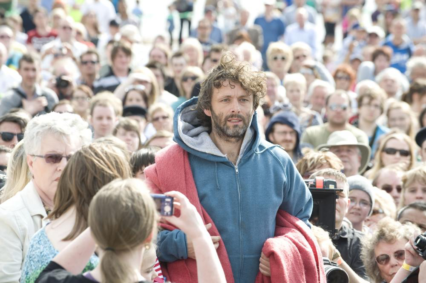
But, rightly, the company would be judged on its shows with McGrath offering a year of plays that would define NTW’s approach. It was the final production in that launch year that cemented the company’s place as a genuine maker of change. The Passion, starring Michael Sheen, and played out across the streets of Port Talbot over an Easter weekend, was a remarkable national moment, proving to an unsuspecting, even doubtful, public that theatre can truly reflect and empower communities. Lyn Gardner described it as “like watching a town discover its voice through a shared act of creation,” making Port Talbot “one of the happiest places on Earth.”
Theatr Genedlaethol Cymru was still in its infancy when the decade began, but in need of a play that would prove its worth as a creator of fine theatre as much as its significance as a political institution (I would suggest Theatr Gen was campaigned for, desired, and appreciated much more than its younger English-language cousin but needed a change in leadership at the turn of the decade). Their first great play came in 2011 with Dafydd James’ irreverent, caustic yet optimistic Llwyth, a co-production with the Sherman.
A story of a group of Welsh-speaking gay men navigating a night out in Cardiff would be far from controversial now, yet at that time, James’ script and Arwel Gruffydd’s direction (this soon led to his appointment as Theatr Gen’s director) breathed fresh air into the Welsh language scene, and opened up opportunities for the likes of Steffan Donnelly (My Body Welsh) and Gethin Evans and Elgan Rhys’ Cwmni Pluen (Woof, Ti.Me) whose exciting approach has since propelled theatr Cymraeg into a bolder, brighter era.
Theatr Gen continues to be revered by its loyal audience (an extraordinary feat in such difficult times) and while it has been a leader in creating progressive inroads into the industry compared to national companies elsewhere in the British isles, especially for women, it’s a company that needs another truly great drama. Perhaps, then, Dafydd James’ sequel to Llwyth, currently in the offing, will provide that moment – as well as reminding us how much we’ve all aged.
NTW began and ended the decade with two of its finest works (though plaudits also for The Radicalisation of Bradley Manning). Nine years on from The Passion, Ed Thomas’ On Bear Ridge triumphantly opened in Cardiff before an extended run at the Royal Court. While NTW forged an international reputation for event-theatre such as that seen in Port Talbot in 2011 (with 2016’s Roald Dahl celebration, City of the Unexpected, proving to be the zenith of this approach, luring hundreds of thousands into the capital’s streets), discontent over its perceived aversion to regular plays told on regular stages culminated with the writers’ letter of 2018 in which the company’s standing as a national body was severely questioned. Kully Thiarai’s elegant and proactive response should be applauded – her gentler approach will be missed in Wales – and On Bear Ridge answered some of the company’s critics. NTW now needs to rally audiences back to its work.
North and South
Two of our most established theatre companies, at opposite ends of the country, have surged in reputation and quality since 2010, in both cases appointing artistic directors from outside Wales but with a commitment to developing the work of Wales-based playwrights. Our theatre landscape has been inextricably changed by Rachel O’Riordan joining Sherman Theatre in 2014 and Tamara Harvey taking the reins at Theatr Clwyd a year later. These two women have both faced structural challenges, initial unwarranted hostility (a disturbing reoccurring theme in the industry), and resistance to change. In both cases, they have faced down these obstructions and created work that has elevated Wales’ theatrical standing.
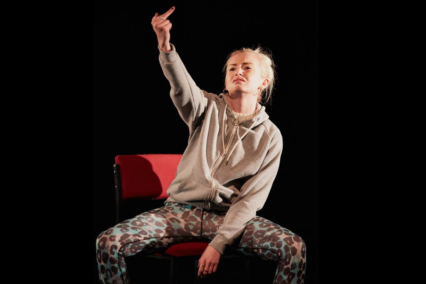
In my view, our greatest success of these past ten years has been Gary Owen’s Iphigenia in Splott which lay dormant on a shelf until O’Riordan dusted it down and turned it into one of the most affecting and relevant dramas produced here this century. This play’s journey from Sherman’s studio to London, Edinburgh then Broadway remains a cultural highlight that will be remembered in decades to come, and thanks in no small part to Sophie Melville’s masterclass in aggressive vulnerability. If one play should represent the 2010s in its themes and in its theatrical quality, this would be it.
Meanwhile, Theatr Clwyd under Harvey continues to lure staggering audience numbers against all geographical odds, while also shaking off its previous slightly conservative image. The Assassination of Katie Hopkins and Home, I’m Darling became hits across the UK and reminded London critics that theatre created here is bold, salient and commercially viable. Simultaneously, Harvey and her team have partnered with Paines Plough, the BBC and Theatr Genedlaethol Cymru to nurture writing talent.
While O’Riordan has moved on to the Lyric in London, her legacy remains, while Tamara Harvey continues to steer a beloved company in radical directions that would have seemed impossible before her arrival.
Telling Our Stories
Gary Owen’s reimagined Iphigenia earned him the prestigious James Tait Black Memorial Prize for Drama, incredibly the second Welsh winner in four years of this international award. Tim Price’s Bradley Manning play was the first. International renown marks this as a golden era for Welsh writing, even against the backdrop of the playwrights’ frustration with one of its national companies. And yet few Welsh plays are breaking through beyond shorter runs in smaller theatres.
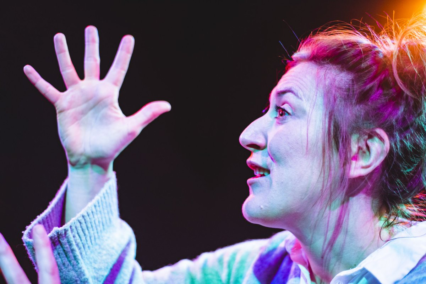
It may be economies of scale: few companies in Wales have the facilities to produce mainstage new writing. The drivers of this bold new wave are the fringe companies. The terrific Dirty Protest has quietly developed the likes of Matthew Bulgo, Branwen Davies, Kath Chandler, Alan Harris and Alun Saunders with its pub readings and scratch nights. More recently, the company’s accomplished fully produced plays have cultivated a cult following for their work, but the next hurdle remains the penetration of the wider public consciousness.
An issue I and others wrestled with at the Arts Council was how we can create a terrain where touring new work is financially viable. Current funding allows only for sporadic one-off tours with little scope for creating longer-term relationships with audiences throughout Wales. The Other Room has commendably nurtured a niche fan group for its excellent work, but it has the enviable resource of a small theatre attached to a popular pub in which to engage and develop its audience – and it remains one of the decade’s success stories for accomplishing this. If only this could be emulated nationally.
The Welsh are Coming!
Many of the aforementioned productions – Iphigenia, Manning, Llwyth, a plethora of Dirty Protest shows – have found further acclaim through presence at Edinburgh. The impact of the Fringe on the wider world’s (and, indeed, Wales’ own) perceptions of the quality of our theatre scene should not be underplayed. We have seen unprecedented levels of exposure for Welsh work, firmly demonstrating its excellence within the international scene. The highlight for me was Seiriol Davies’ How To Win Against History (produced with Pontio) which exploded abrasively onto the festival in 2016 and won a raft of awards, including the Fringe First Best Musical, an almost ridiculous feat given that it was played out by three actors with a single keyboard in a shipping container.
Volcano – still a radical, belying its seniority amidst the other upstart companies in Edinburgh – led the way for the Welsh in Edinburgh (and Black Stuff and The Populars ensure its continuing high standing among Fringe-goers) and it’s reassuring to see the Wales brand strengthening there.
What – and Who – is Welsh theatre?
In my experience, the Welsh theatre community consists almost exclusively of liberal and progressive creative people. And so why have we repeatedly witnessed a suspicion of, and even hostility to, artistic leaders who have arrived from outside Wales? I’ve never met a single individual in the sector who appears to harbour xenophobic views, and yet the likes of Rachel O’Riordan, Tamara Harvey and Kully Thiarai have undoubtedly faced a kind of institutionalised antipathy, intentional or otherwise. I remember seeing Rachel O’Riordan in her first month at the Sherman field an open meeting with angry artists in a way that was admirable if only for the way she refused to crumble amid a toxic atmosphere. Anger and criticism was aimed at her before she had even signalled her artistic intentions for the company. I worried she would up-sticks before she had unpacked her bags and I wouldn’t have blamed her.
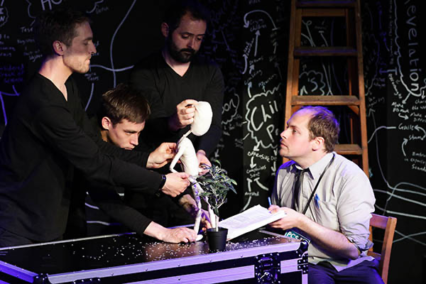
Part of this sense of feeling is understandable. Politically, socially and creatively, we in Wales are used to being told what to do by outsiders, to the point of coercion. A collective Stockholm Syndrome that extended to Wales voting to leave the European Union in 2016 is a national trait that our artists are desperate to battle against. Repeatedly pillaged as a society, our artists’ rebellious streak is a natural, admirable defence mechanism born of historical resonance. But this rebellion has sometimes been misplaced. These qualified leaders who have arrived in Wales – and it’s perhaps telling that, in the worst cases, the individuals have been women – deserve better. Without them, we are much poorer and sink further into the abyss of insularity that led to Brexit and which should be anathema to the theatre community.
And yet, for all this, Wales’ theatre scene remains more equal in terms of gender representation in key roles and creative appointments than the rest of the UK – gender equality here makes the likes of England’s National Theatre, indeed much of the London scene, appear positively prehistoric.
As for ethnic diversity, then we still have some way to go. Kully Thiarai’s appointment at NTW made her the first woman of colour to lead a national theatre company anywhere in the UK and yet can the sector claim to have supported her in the same way it did John McGrath? The difference between her reception and that of her predecessor can be attributed to a range of issues, certainly not all race-related, but we need to calmly reflect on how an agenda of “Welsh jobs for Welsh people” might be viewed, rightly or wrongly, particularly when aimed at a non-white woman from outside Wales. Simultaneously, though, we need to allow for proper debate about national companies’ roles and their leadership without fear of it being unjustly tarred as racially motivated. Trial by social media ostracization will only stymy debate, not inspire it. We are all responsible for ensuring legitimate dialogue continues without such intimidation.
Elsewhere, Fio, August 012 and Common Wealth have emerged as deliverers of theatre that consciously reflects a broader ethnicity, while established companies have progressively become more conscious of a wider racial profile, especially with regard to casting. The Arts Council of Wales’ more dynamic Strategic Equality Plan urges further movement in this direction, so one hopes we are witnessing the nascent beginnings of a meaningful change.
The 2010s have also seen Welsh drama truly embrace a sense of inclusivity in terms of disability arts. Hijinx Theatre’s rise has been meteoric in the manner in which it has metamorphosised. Ground-breaking work such as Meet Fred (also an Edinburgh hit) and Into The Light are transforming people’s perceptions of the quality of inclusive theatre, and even their perceptions of disability itself.
At the end of the decade, Leeway Productions’ The Last Five Years and Taking Flight’s Peeling (the latter’s writer Kaite O’Reilly being our finest individual exponent of Deaf and disability theatre) have also demonstrated how far we have come in terms of sheer, fuck-you quality, as well as audience acceptance. We should celebrate this.
Similarly, Sarah Argent’s work for babies and the very young extends the possibilities of theatre, and for whom it is created. My own children, now eight and eleven years old, began their own relationships with theatre thanks to her progressive creative experiments alongside Kevin Lewis. This does not happen everywhere and yet – displaying another notable Welsh trait – we seem unaware of, or even embarrassed to laud, the fact we can be pioneers too.
But what of the future and the next decade…? We are all – makers, audiences, funders, critics – part of a small national community, creating work during a dangerous period of history. We should continue to question, criticise and debate with one another about future directions, but we should also celebrate how closely knit we can be. Our national companies are approachable in a way that’s not the case elsewhere in the world, and our fringe scene is as vibrant as it’s been for a long time. No-one is ghettoised here, so let’s claim that – embrace it – and show a fractured, fractious society what a fiercely powerful force that makes us.
For more Wales Arts Review coverage of National Theatre Wales, including news, reviews, and interviews, click here.


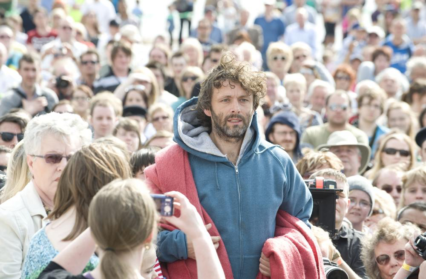
 Enjoyed this article? Support our writers directly by buying them a coffee and clicking this link.
Enjoyed this article? Support our writers directly by buying them a coffee and clicking this link.








